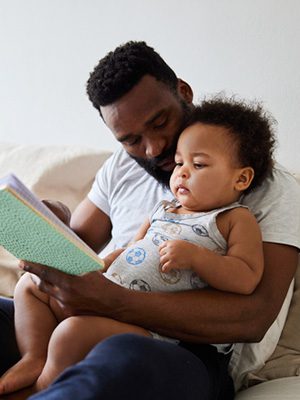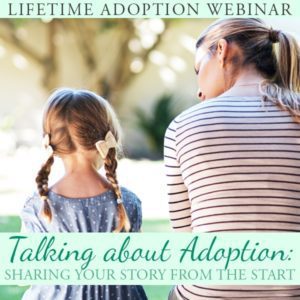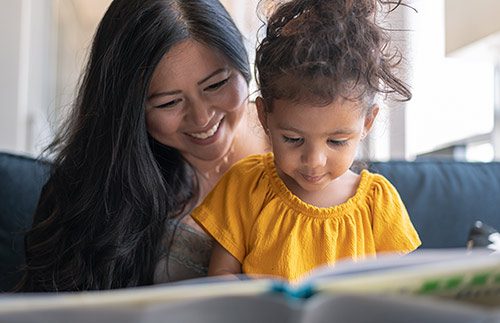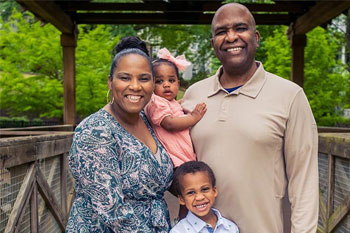
Early and open communication about adoption is essential, but figuring out how to approach the topic can be challenging. In this discussion, we’ll explore some significant factors that adoptive parents should consider when sharing their child’s adoption story, as well as tips for introducing the topic to your child at a young age.
“When should I tell my child about their adoption?”
“What if they don’t understand, or it makes them sad?”
“Why do some parents decide they’re not telling their child they are adopted?”
These are some of the most common questions asked by hopeful adoptive parents struggling to find the correct answers. It’s natural to wonder when to tell your child they were adopted. How you’ll share about adoption depends on the child, their age, and whether they have an open adoption.
Many adoptive families question how and when to tell a child their adoption story. Here are some suggestions to help you determine the best way to share your child’s adoption story with them. Remember, if you’re struggling, you can reach out to your Lifetime Adoption specialist for customized advice and guidance.
Be Honest
The old belief was that adoptive parents shouldn’t tell their children about the adoption. Adoption was a family secret, and parents felt as if they were ashamed to admit it. When the child inevitably found out, they felt alienated and betrayed by their parents, wondering what else they were hiding from them.
Keeping the adoption a secret was difficult to practice in real life, and it was also dishonest. It’s hard to maintain a lie this big forever because the extended family may knowingly or unknowingly let the cat out of the bag. Other times, 23andMe test results years down the road reveal the truth.
Thankfully, today, adoption experts recommend against adoptive parents withholding their child’s history from them. “This recommendation is based on years of research documenting the negative effects of secrecy on adopted individuals. Psychologists emphasize the long-term benefits trust builds between parents and their children, as well as the need adopted individuals have to know the truth about their origins in order to fully understand themselves and have healthy and meaningful relationships,” writes Abbie E. Goldberg, a psychologist who studies open adoption.
Since adoption is a part of their life, not disclosing this to them is like lying. Honesty is your priority when telling your child their adoption story.
Start Early
Most adoption professionals, including myself, recommend you begin talking about your child’s adoption right away. Adoptive parents should talk about adoption from day one, even in infancy. Start using adoption language in your day-to-day life, even if your baby doesn’t yet understand what you’re saying.
Talking about adoption early on means that when your child asks questions about who they are, you’ll already have the topic of adoption incorporated into the conversation. It will be as natural as your connection with them and an essential part of their understanding of themselves.
You might tell your child when they’re very young that they grew in someone else’s tummy and were placed in your home as soon as they were born. The point is that you should give the child a chance to embrace the idea of adoption from a very young age.
Share in an Age-Appropriate Way
Having age-appropriate conversations about adoption is vital to nurturing a healthy parent-child relationship. Of course, how you explain adoption to a two-year-old differs from what you say to a ten-year-old. It’s important to have a plan for starting these conversations, even if you’re worried about what they’ll ask you and how it will affect your relationship.

- God Found Us You
- Tell Me Again About the Night I Was Born
- I’m Adopted!
- The Story of My Open Adoption
As you read these books, incorporate details from your child’s adoption story. These books will encourage questions and natural conversation.
Like all stories, your child’s adoption story will grow gradually over time. Once they’re old enough to embrace their story, they’ll have all the parts they need. Your child’s questions about their adoption will change over the years and lead to many great conversations.
Shares adoptive mom, Jessica, “When my husband and I started looking into adoption, I was online all the time, scouring it for all the knowledge I could. I wanted to be the best parent possible to our adopted child so I searched for recommendations on when to tell a child they are adopted. I’m glad I did because then I knew to start talking about it from day one! We adopted our daughter two years ago and we’ve been reading her ‘I’m Adopted’ every night. I just love the story we’re starting to share with her about how she came into our lives. She asks the sweetest, most sincere questions!”
Have Ongoing Conversations
It is unrealistic to expect a very young child to grasp the idea of adoption right away. You may have to repeat it a few times throughout their childhood until they understand what it means.
The adoption conversation with your child will be ongoing, not just a “one-time” affair. As your child grows, they will be able to understand complex concepts and their questions, and this conversation will change.
For example, when your child is a preschooler, you might explain their birth mother wasn’t healthy enough to care for them. Then, once your child is a teen, you might share their birth mother faced alcoholism.
A three- to five-year-old may ask why her birth mother did not keep her and worry that since her first mother left her, maybe her second one will too. When your child is a little older, they will better understand being adopted and may ask specific questions about their birth parents.
It’s important for children to have all relevant information by adolescence. Identity formation starts early but takes center stage during the teen years when questions about self and relationships arise. For adopted teens, grappling with their conception is crucial to forming a complete identity. If you mislead them about their origins, uncovering the truth later can trigger feelings of betrayal, amplifying the shame and guilt often associated with adoption secrecy.
Support their Birth Parents
Your child might want a connection with their birth parents, so your goal should be to encourage acceptance and empathy. Grow your open adoption relationship with your child’s birth parents. Someday, your child will want to get answers to their questions directly from the source. Cultivating a positive relationship with their birth parents will make this much more accessible.
Talk about your child’s birth parents regularly throughout their life. On your child’s birthday, you might say something like, “I’m thinking of your birth mom today…that was a big day for all of us!” Or, you can tell your child when you see similar traits, such as their birth mother’s eyes or birth father’s nose. Discussing birth parents lets your child positively explore their identity and how adoption has shaped their lives.
It is natural for a child to get hurt or upset as they try to grasp the implications of adoption. But if you talk about adoption openly, honestly, and caringly, it will significantly minimize any hurt.
If you don’t know the answers to certain questions, admit it. Just let your child know that it is okay to talk about adoption and that you are willing to answer any related questions. Opening the door to their questions will significantly build your child’s confidence in you and make it easier for them to digest the information shared.
The Benefits of Honesty
Maintaining your child’s trust in you isn’t the only benefit of telling them the truth about their adoption. Another way this information benefits them is that you’re protecting them from the shock of finding another way, such as accidental disclosure from a relative or family friend. You’re also allowing them to access their family medical history, which is vital should any health issues arise.
Adoptive parents who share with their child about their adoption offer the child the chance to learn more about themselves. For example, they can learn from whom they inherited their hair color or whom they most resemble. Finally, you’ll prevent the possibility of shame resulting from hiding the truth. Adoption is part of their story, and they have a right to know about it.
“In order to understand who you are, you need to know where and who you come from. Our children often have distorted, incomplete, or even fictitious accounts of their families. In the absence of the truth, they are left to fill in gaps or create a story entirely on their own. Moreover, the lack of a dialogue about their family can lead them to believe that there is nothing positive or good in their background. And so, perhaps, there is nothing positive or good about themselves. Children need to know that the genes they carry bring strength, talents, and unlimited potential – not just the challenges that brought them into foster care and adoption in the first place.” writes Kim Stevens, Adoptive Parent and former Project Manager at the Center for Adoption Support and Education.
Lifetime Adoption
Many adoption agencies, including Lifetime, provide both pre- and post-adoption support. Contact your agency if you need help with a roadblock in your open adoption. Open adoption works well when adoption agencies offer these services to birth parents and adoptive parents. Lifetime Adoption has been helping adoptive parents and birth parents navigate open adoptions since 1986, building a bond that benefits everyone, especially the child.

In “Talking about Adoption With Your Child,” two experienced adoptive mothers share what helped their child understand their unique adoption story. Tune in and get tips on where to start and how to make adoption a topic open for discussion as your child grows up. Watch “Talking About Adoption With Your Child” at AdoptionWebinar.com.
Editor’s Note: This article was originally published on September 26, 2018, and has since been updated.
Founder of Lifetime Adoption, adoptive mom, adoption expert, and Certified Open Adoption Practitioner (C.O.A.P).
Since 1986, adoption expert Mardie Caldwell has been dedicated to bringing couples and birth parents together in order to fulfill their dreams.
“Many years ago, I was also searching for a child to adopt. We didn’t know where or how to get started. Through research, determination, and a prayer, our dream of a family became reality. I started with a plan, a notebook, assistance from a caring adoption consultant and a lot of hard work; this was my family I was building. We had a few heartaches along the way, but the pain of not having children was worse!
Within weeks we had three different birth mothers choose us. We were overwhelmed and delighted. Many unsettling events would take place before our adoption would be finalized, many months later. Little did I know that God was training and aligning me for the adoption work I now do today. It is my goal to share with our families the methods and plans which succeed and do not succeed. I believe adoption should be affordable and can be a wonderful “pregnancy” for the adoptive couple.
I have also been on both sides of infertility with the loss of seven pregnancies and then conceiving by new technology, giving birth to a healthy daughter. I have experienced first-hand the emotional pain of infertility and believe my experience allows me to serve your needs better.
It is my hope that for you, the prospective parents, your desire for a child will be fulfilled soon.”






0 Comments
Trackbacks/Pingbacks